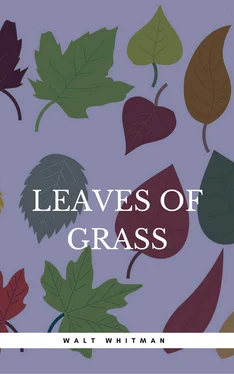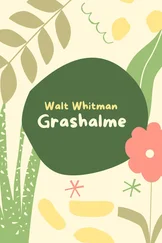Walt Whitman - Leaves of Grass
Здесь есть возможность читать онлайн «Walt Whitman - Leaves of Grass» — ознакомительный отрывок электронной книги совершенно бесплатно, а после прочтения отрывка купить полную версию. В некоторых случаях можно слушать аудио, скачать через торрент в формате fb2 и присутствует краткое содержание. ISBN: , Жанр: Языкознание, Критика, на английском языке. Описание произведения, (предисловие) а так же отзывы посетителей доступны на портале библиотеки ЛибКат.
- Название:Leaves of Grass
- Автор:
- Жанр:
- Год:неизвестен
- ISBN:9782377930524
- Рейтинг книги:4 / 5. Голосов: 1
-
Избранное:Добавить в избранное
- Отзывы:
-
Ваша оценка:
- 80
- 1
- 2
- 3
- 4
- 5
Leaves of Grass: краткое содержание, описание и аннотация
Предлагаем к чтению аннотацию, описание, краткое содержание или предисловие (зависит от того, что написал сам автор книги «Leaves of Grass»). Если вы не нашли необходимую информацию о книге — напишите в комментариях, мы постараемся отыскать её.
Leaves of Grass — читать онлайн ознакомительный отрывок
Ниже представлен текст книги, разбитый по страницам. Система сохранения места последней прочитанной страницы, позволяет с удобством читать онлайн бесплатно книгу «Leaves of Grass», без необходимости каждый раз заново искать на чём Вы остановились. Поставьте закладку, и сможете в любой момент перейти на страницу, на которой закончили чтение.
Интервал:
Закладка:
From the American Phrenological Journal
LEAVES OF GRASS. Poems by Walt Whitman . Brooklyn, 1855. MAUD, and other Poems. By Alfred Tennyson . London, 1855.
It is always reserved for second-rate poems immediately to gratify. As first-rate or natural objects, in their perfect simplicity and proportion, do not startle or strike, but appear no more than matters of course, so probably natural poetry does not, for all its being the rarest, and telling of the longest and largest work. The artist or writer whose talent is to please the connoisseurs of his time, may obey the laws of his time, and achieve the intense and elaborated beauty of parts. The perfect poet cannot afford any special beauty of parts, or to limit himself by any laws less than those universal ones of the great masters, which include all times, and all men and women, and the living and the dead. For from the study of the universe is drawn this irrefragable truth, that the law of the requisites of a grand poem, or any other complete workmanship, is originality, and the average and superb beauty of the ensemble. Possessed with this law, the fitness of aim, time, persons, places, surely follows. Possessed with this law, and doing justice to it, no poet or any one else will make anything ungraceful or mean, any more than any emanation of nature is.
The poetry of England, by the many rich geniuses of that wonderful little island, has grown out of the facts of the English race, the monarchy and aristocracy prominent over the rest, and conforms to the spirit of them. No nation ever did or ever will receive with national affection any poets except those born of its national blood. Of these, the writings express the finest infusions of government, traditions, faith, and the dependence or independence of a people, and even the good or bad physiognomy, and the ample or small geography. Thus what very properly fits a subject of the British crown may fit very ill an American freeman. No fine romance, no inimitable delineation of character, no grace of delicate illustrations, no rare picture of shore or mountain or sky, no deep thought of the intellect, is so important to a man as his opinion of himself is; every thing receives its tinge from that. In the verse of all those undoubtedly great writers, Shakspeare just as much as the rest, there is the air which to America is the air of death. The mass of the people, the laborers and all who serve, are slag, refuse. The countenances of kings and great lords are beautiful; the countenances of mechanics are ridiculous and deformed. What play of Shakspeare, represented in America, is not an insult to America, to the marrow in its bones? How can the tone never silent in their plots and characters be applauded, unless Washington should have been caught and hung, and Jefferson was the most enormous of liars, and common persons north and south should bow low to their betters, and to organic superiority of blood? Sure as the heavens envelop the earth, if the Americans want a race of bards worthy of 1855, and of the stern reality of this republic, they must cast around for men essentially different from the old poets, and from the modern successions of jinglers and snivellers and fops.
English versification is full of these danglers, and America follows after them. Every body writes poetry, and yet there is not a single poet. An age greater than the proudest of the past is swiftly slipping away, without one lyric voice to seize its greatness and speak it as an encouragement and onward lesson. We have heard, by many grand announcements, that he was to come; but will he come?
A mighty Poet whom this age shall choose
To be its spokesman to all coming times.
In the ripe full-blown season of his soul,
He shall go forward in his spirit’s strength,
And grapple with the questions of all time,
And wring from them their meanings. As King Saul
Called up the buried prophet from his grave
To speak his doom, so shall this Poet-king
Call up the dread past from its awful grave
To tell him of our future. As the air
Doth sphere the world, so shall his heart of love—
Loving mankind, not peoples. As the lake
Reflects the flower, tree, rock, and bending heaven,
Shall he reflect our great humanity;
And as the young Spring breathes with living breath
On a dead branch, till it sprouts fragrantly
Green leaves and sunny flowers, shall he breathe life
Through every theme he touch, making all Beauty
And Poetry forever like the stars. ( Alexander Smith .)
The best of the school of poets at present received in Great Britain and America is Alfred Tennyson. He is the bard of ennui and of the aristocracy and their combination into love. This love is the old stock love of playwrights and romancers, Shakspeare the same as the rest. It is possessed of the same unnatural and shocking passion for some girl or woman, that wrenches it from its manhood, emasculated and impotent, without strength to hold the rest of the objects and goods of life in their proper positions. It seeks nature for sickly uses. It goes screaming and weeping after the facts of the universe, in their calm beauty and equanimity, to note the occurrence of itself, and to sound the news, in connection with the charms of the neck, hair, or complexion of a particular female.
Poetry, to Tennyson and his British and American eleves, is a gentleman of the first degree, boating, fishing, and shooting genteelly through nature, admiring the ladies, and talking to them in company with that elaborate halfchoked deference that is to be made up by the terrible license of men among themselves. The spirit of the burnished society of upper-class England fills this writer and his effusions from top to toe. Like that, he does not ignore courage and the superior qualities of men, but all is to show forth through dandified forms. He meets the nobility and gentry half-way. The models are the same both to the poet and the parlors. Both have the same supercilious elegance, both love the reminiscences which extol caste, both agree on the topics proper for mention and discussion, both hold the same undertone of church and state, both have the same languishing melancholy and irony, both indulge largely in persiflage, both are marked by the contour of high blood and a constitutional a version to anything cowardly and mean, both accept the love depicted in romances as the great business of a life or a poem, both seem unconscious of the mighty truths of eternity and immortality, both are silent on the presumptions of liberty and equality, and both devour themselves in solitary lassitude. Whatever may be said of all this, it harmonizes and represents facts. The present phases of high-life in Great Britain are as natural a growth there as Tennyson and his poems are a natural growth of those phases. It remains to be distinctly admitted that this man is a real poet, notwithstanding his ennui and his aristocracy.
Meanwhile a strange voice parts others aside and demands for its owner that position that is only allowed after the seal of many returning years has stamped with approving stamp the claims of the loftiest leading genius. Do you think the best honors of the earth are won so easily, Walt Whitman? Do you think city and country are to fall before the vehement egotism of your recitative of yourself?
I am the poet of the body,
And I am the poet of the soul.
The pleasures of heaven are with me, and the pains of hell are with me,
The first I graft and increase upon myself, the latter I translate into a new tongue.
I am the poet of the woman the same as the man,
And I say it is as great to be a woman as to be a man,
And I say there is nothing greater than the mother of men.
Интервал:
Закладка:
Похожие книги на «Leaves of Grass»
Представляем Вашему вниманию похожие книги на «Leaves of Grass» списком для выбора. Мы отобрали схожую по названию и смыслу литературу в надежде предоставить читателям больше вариантов отыскать новые, интересные, ещё непрочитанные произведения.
Обсуждение, отзывы о книге «Leaves of Grass» и просто собственные мнения читателей. Оставьте ваши комментарии, напишите, что Вы думаете о произведении, его смысле или главных героях. Укажите что конкретно понравилось, а что нет, и почему Вы так считаете.












